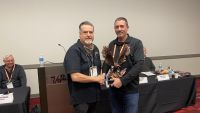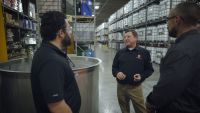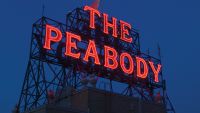Contractor to Contractor: Fairweather Masonry Company, Inc.
By Masonry
Fairweather Masonry Company, Inc. of Bellevue, Washington has over 33 years of experience in the Northwest specializing in commercial, industrial, and institutional CMU, brick and stonework. Fairweather Masonry is a family-owned and operated company led by Rob Fairweather, its owner and President. Monty Fairweather, Rob's son, serves as Vice President of Operations, focusing on customer relations and marketing. Fairweather has grown from a small residential subcontractor to one of the largest and most capable masonry firms in the Northwest, with over $15 million a year in subcontract work. Winning over nine awards in the last four years hasn't hurt either. Monty Fairweather spoke with us about their high performance track record — past, present and future.
Masonry: Since the beginning over 30+ years ago, Fairweather has grown considerably in size and won numerous awards. What do you think has been the key to your company's growth and success over the years?
Fairweather: I guess the first thing would be Rob Fairweather, President of Fairweather Masonry — he has been the biggest factor. Rob started the business in 1967 as a hod carrier, who hired a couple of bricklayers and worked on small residential. Rob would do all of the bidding and books at night and pack hod all day. From day one, he has been that driven.
The other two factors would be the people that we have working for us and the top of the line equipment we have. We believe we have the best workforce in the country, and in order to keep them working you have to have well-maintained equipment. Our equipment goes back to our shop after every job and gets a complete going over, from lube, oil to paint.
Masonry: Fairweather Masonry has moved from small residential in the beginning to large commercial, industrial and institutional work in the present. What caused this shift, from residential to commercial?
Fairweather: It was a natural shift I suppose. Rob was doing work for small residential/commercial contractors who did both. I remember some of the first commercial jobs we did were 7-Elevens and Wendy's. We did these back then without forklifts and grout pumps.
Masonry: Fairweather offers new construction as well as restoration of historic buildings. Do you feel that, as the years pass, restoration will play a greater role in not only your business, but for all mason contractors?
Fairweather: 100%. A lot of the buildings we restore are 100+ years old and are just beautiful. The craftsmanship on those buildings is just something that they just don't let us do anymore on new construction. We believe that if we keep these buildings restored and useable for another 100 years why wouldn't everyone want to build with masonry.
Masonry: Fairweather is proud of its safe work environment. What proactive steps do you take to keep your workers safe?
Fairweather: Dave LaFranchi is our full-time safety director at Fairweather Masonry. Many people think that they can't afford to have a full-time safety director; we think you can't afford not to.
Safety needs constant maintenance so we want everyone thinking safe all the time. We hold company wide safety meetings to make sure most of our people are CPR trained, as well as other related safety training. There isn't anything out there that's worth one of your people getting hurt.
Masonry: Your company keeps a large stock of masonry equipment, such as scaffolding, material handling, mixers and pumps, on hand rather than renting. Do you feel this is an extra incentive for people to choose you over other mason contractors?
Fairweather: We hope so. Like I said earlier, equipment is one of the keys to success. We also have self-erecting cranes, enclosed cab boom trucks, and two full-time mechanics to support our team. We know we have gotten work because contractors know we can support anything.
Masonry: Fairweather participates in charity fundraising and activities for the Boy Scouts of America and the National Multiple Sclerosis Society. Tell us a little more about your participation in these and other charity events.
Fairweather: We are some very fortunate people and we know that there are a lot of not so fortunate people in the world. If we can help just a little, we should. It's our way of giving back to the community.
Masonry: Fairweather also sponsors a team in the World Softball League and a boat in the Budweiser Unlimited Hydroplane Series tour. Tell us a little more about how you got involved in these sponsorships and how this publicity has assisted your company.
Fairweather: We really don't do it for the notoriety, although it is fun. As we speak, our softball team is playing in the World Series in Florida. The hydroplane is an interesting story because one of the two bricklayers that my dad hired when he first started is the guy who owns the hydroplane now. As a kid, I remember my dad taking me over to Fred's house and looking at the limited hydroplanes he used to race.
Masonry: Fairweather utilizes a company web site in its marketing plan. How has this tool affected your business?
Fairweather: It is actually very new to us, but we wanted to get out to a wider range of people to let them know what we are about. We are constantly working with contractors, engineers and architectural firms on initial design stages of projects. We thought that this was a way for people to see some of the things we have done and maybe getting some ideas.
Masonry: Looking back over the years, what was your most difficult masonry project and how did you overcome the obstacles?
Fairweather: The most difficult by far would be Safeco Field. We laid over one million pieces of masonry in two years and two months with basically a half complete set of drawings. It was a tremendous learning experience for us though, as we took on a huge scope plus the complete exterior design. Safeco Field is a national award-winning project, despite its difficult nature.
Masonry: What is the best advice you would give a budding mason contractor?
Fairweather: If you think your going to come in and start a company and work your eight hours and go home, it doesn't work that way. You need to live it 24/7. Also, quality workmanship is something you can't skip.
Masonry: What do you feel is the biggest misconception about the masonry industry?
Fairweather: That there are better building materials other than masonry.
Masonry: What would you do to change that misconception?
Fairweather: We work with the Masonry Institute of Washington to try to educate as many people as possible that masonry is the best choice. The masonry industry in Seattle is putting forth an outstanding effort to retain our market share. We also spend a lot of time educating designers and contractors about the benefits of masonry.
Masonry: What are your three biggest concerns in keeping your company successful?
Fairweather: We need the work first. Then, we need to build the work — safely — with high quality and productively. We also need to keep educating people about masonry.
Masonry: What do you feel is the industry's biggest challenge in the near future?
Fairweather: Skilled craftsmen. The average age of a mason continues to grow and the interest of young masons is dwindling. We think it's because we haven't done a good job at getting to the schools and letting the young people know just what a great occupation they could have. I work on the local JATC in Washington and think we are on a good track to change this.
Masonry: Where do you think the masonry industry is going to be 10 years from now?
Fairweather: Hopefully flourishing. We need to continue our education efforts, not only on a local effort but a national one as well. Recruitment of a new workforce is essential.
Masonry: What do you think will be the masonry industry's biggest competitor in 10 years?
Fairweather: I think tilt-up, but there are new products and systems coming out everyday.
Masonry: What do you feel are the most critical issues you'll face with future government regulations?
Fairweather: In Seattle, ergonomics is still an issue. That could be a huge blow. Insurance is another issue that is hurting everyone in the construction industry.
Masonry: Which group do you feel has the bigger impact on masonry's future: architects, engineers or general contractors?
Fairweather: They all have a big impact on masonry, each with specific issues. As an industry, we need to continue our education efforts.
Masonry: What do you like most about being a member of MCAA?
Fairweather: I think it keeps us united as an industry. It's a good thing to know that we all have the same problems and successes. The Masonry Showcase gets us all together where we can meet and share new products and ideas. There is power with numbers, and if we stick together we can make a difference.
About the Author
Masonry, the official publication of the Mason Contractors Association of America, covers every aspect of the mason contractor profession - equipment and techniques, building codes and standards, business planning, promoting your business, legal issues and more. Read or subscribe to Masonry magazine at www.masonrymagazine.com.


















